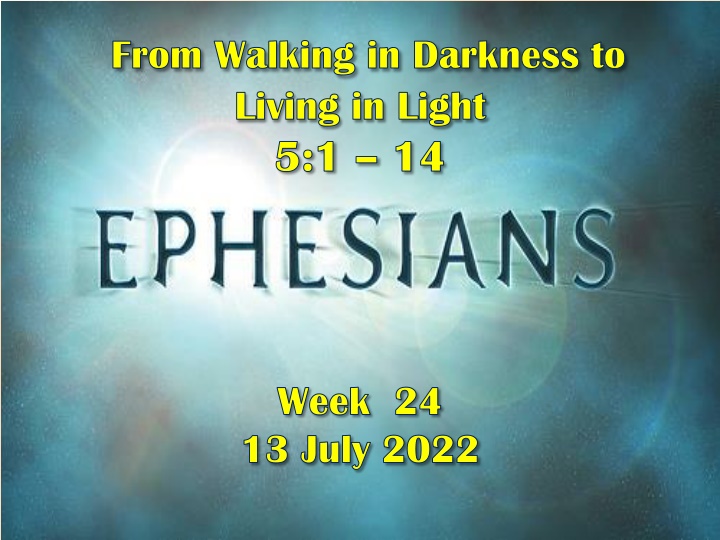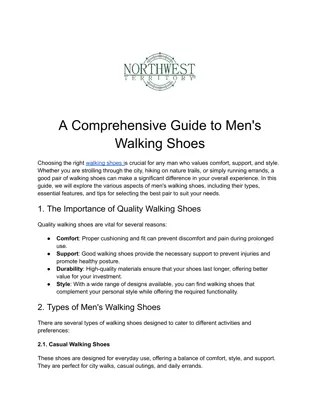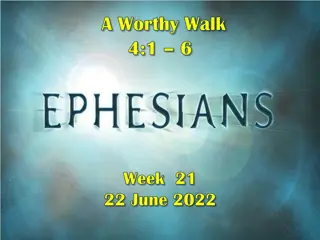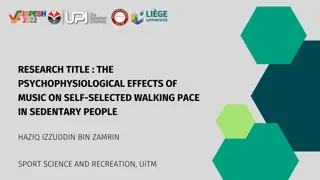Walking from Darkness to Light: Ephesians 5:1-14 Perspective
Explore the transformation from walking in darkness to living in light as highlighted in Ephesians 5:1-14. Through vivid storytelling and insightful reflections, the passage emphasizes the importance of following the light, exemplified by lighthouses, as a guide for living a life of love, righteousness, and truth.
Download Presentation

Please find below an Image/Link to download the presentation.
The content on the website is provided AS IS for your information and personal use only. It may not be sold, licensed, or shared on other websites without obtaining consent from the author.If you encounter any issues during the download, it is possible that the publisher has removed the file from their server.
You are allowed to download the files provided on this website for personal or commercial use, subject to the condition that they are used lawfully. All files are the property of their respective owners.
The content on the website is provided AS IS for your information and personal use only. It may not be sold, licensed, or shared on other websites without obtaining consent from the author.
E N D
Presentation Transcript
From Walking in Darkness to From Walking in Darkness to Living in Light Living in Light 5:1 5:1 14 14 Week 24 Week 24 13 July 2022 13 July 2022
EPHESIANS CH5 OVERVIEW Paul continues to exhort the Ephesians Christians to walk in a manner worthy of their calling (cf. 4:1). Having previously described the need to walk in unity and in purity, he now urges them to imitate God and walk in love with Christ as their example (1-3). Paul says to walk in love requires that all forms of immorality and filthy speech not be named among the Ephesians. Since the wrath of God is to come upon the sons of disobedience, Christians must not be deceived by nor partake with those who engage in such evil deeds (4-6).
EPHESIANS CH5 OVERVIEW Since they have passed from darkness to light in coming to Christ, we should also walk as children of light. This includes producing the fruit of the Spirit such as goodness, righteousness and truth, thereby demonstrating what is acceptable to the Lord (7-10). As Christians we are not to participate in the shameful works of darkness, but instead must expose them. We do this by letting Christ's light shine in us, for such light will naturally make the darkness manifest by way of contrast (11-14).
EPHESIANS 5:1 14 STORY > In the foggy dark, the captain of a massive battleship spotted a faint light. Immediately he ordered his signalman to send this message: Alter your course ten degree south. Promptly the captain received a reply: Alter your course ten degrees north. The indignant captain stiffened and issued another message: Alter your course ten degrees south, I am the captain of this vessel. Almost instantly another was received: I am Seaman Third Class Jones. Alter your course ten degrees north. The captain was fuming at the nerve of this seaman giving orders to a ship captain. This had to stop.
EPHESIANS 5:1 14 STORY > The captain responded, Young man, I repeat: Alter your course ten degrees south. This is a battleship. Then came the terse reply as the light pierced the darkness: Captain, I repeat: Alter your course ten degrees north. This is a lighthouse. Though this humorous story is fictional, it illustrates an important point: Lighthouses should never be ignored. They re not placed on islands and shorelines to distract or frustrate us. Their beacon lights are there to protect us. To ignore or defy a light in the darkness is to jettison reason in favor of folly. God s light is like that too. All too often men and women shrink back from it in fear, defy it with arrogance, or ignore it to their peril.
EPHESIANS 5:1 14 Yet believers guided by the Spirit of truth recognize God s light as their saving grace. Ephesians 5:1-14 contrasts the life of light with the life of darkness, exhorting believers to maintain their walk as children of light (5:8) and to expose the deeds of darkness (5:11). But like a stubborn, self-confident captain unwilling to change the course of his proud ship, our sinful flesh will seek to resist the obvious course of action: Heed God s warnings and walk in His ways. To do anything else would mean to run headlong into moral disaster.
EPHESIANS 5:1 2 1Follow God s example, therefore, as dearly loved children 2and walk in the way of love, just as Christ loved us and gave himself up for us as a fragrant offering and sacrifice to God.
EPHESIANS 5:1 2 Paul returns to the familiar theme of walking, an image that launched his practical section in Ephesians 4:1, where he wrote, Therefore I, the prisoner of the Lord, implore you to walk in a manner worthy of the calling with which you have been called. In 5:2, he exhorts his readers to walk in love. In fact, Paul tells them to be imitators of God (5:1). The Greek word for imitators is the English word mimic. When we mimic somebody, we act out what they re doing; we follow their lead, trying to copy their actions. But how can we possibly mimic God s action? This would be an incredibly daunting challenge if it were not for Paul s next phrase: as beloved children. In other words, as members of His spiritual family, we should take after our heavenly Father.
EPHESIANS 5:1 2 This is where Christ comes in the true Son of God who took on full, sinless humanity. As God s Son, after whose image we are being renewed by the Holy Spirit, Christ becomes the exemplar the template for what it looks like to be a true human mimicking God. Like an older brother, Christ is the perfect model for us to follow. It stands to reason that , as beloved children, we are to carry on our lives with the characteristics that are true of the Son. He s good; we should be good. He s kind; we must be kind. He s just; we should be fair. He s holy; we are to be pure. He s full of grace; we ought to demonstrate grace toward one another. The list could go on and on . . .
EPHESIANS 5:1 2 Paul also illustrates the extent of our imitation. We are to walk in love unconditional agape love. The example? Christ s self-sacrificial love by which He gave Himself up for us, thus pleasing God as a fragrant aroma (5:2). Paul presents us with the greatest standard of selfless love, just as Jesus Himself taught: Greater love has no one than this, that one lay down his life for his friends (John 15:13). In other words, Jesus is telling us to love our neighbors in the sense of being willing to work for their well-being even if it means sacrificing our own well-being to that end.
EPHESIANS 5:1 2 Like a gloomy, stormy sea, the world around us opposes Christ s way of love at every turn and tries with all its might to crash us into a rocky shoreline. This is why Paul issues a strong summons to purity in the next several verses, which are an urgent warning against the world s destructive, self-serving ways and a clear beacon of light to pierce the darkness.
EPHESIANS 5:3 6 3But among you there must not be even a hint of sexual immorality, or of any kind of impurity, or of greed, because these are improper for God s holy people. 4Nor should there be obscenity, foolish talk or coarse joking, which are out of place, but rather thanksgiving. 5For of this you can be sure: No immoral, impure or greedy person such a person is an idolater has any inheritance in the kingdom of Christ and of God. 6Let no one deceive you with empty words, for because of such things God s wrath comes on those who are disobedient.
EPHESIANS 5:3 6 Like a searchlight scanning the shadowy niches of life, Paul focuses on several sins that can dim the witness of the Christian community. Though we are called to be lights in the world (Phil 2:15), certain behaviors can dim our witness and render us indistinct and ineffective. In fact, the dimmer the light, the more we look like those who are cut off from God s kingdom the children of disobedience upon whom the wrath of God is coming (5:5-6). By associating these deeds of darkness with unbelievers, Paul s exhortation packs a powerful punch: If you re children of the light, don t live like children of darkness! Let s shine some light on the dark deeds that Paul mentions in 5:3-4: immorality, impurity, greed, filthiness, silly talk, and coarse jesting.
EPHESIANS 5:3 6 Paul begins with two deeds that relate to sexual sin. The first, immorality, translated from Greek to our English word pornography. It includes all kinds of sexual sin outside of marriage, including fornication, adultery, homosexuality, and prostitution. While these outward actions should all be avoided, in the Sermon on the Mount Christ focused attention even more pointedly at their inward source the lust that He said was tantamount to committing adultery in the heart (Matt 5:28). Paul also refers to impurity, using the Greek word which is related to our English word catharsis but formed as a negative. Just as something cathartic cleanses us, something akathartic pollutes us.
EPHESIANS 5:3 6 Thus, akatharsia refers to the effects of immorality on our hearts, minds, and bodies moral uncleanness that leads to guilt, shame, habitual sin, obsessions, addictions, and a life that spirals out of control. Paul warns us not to be deceived by these empty words that rationalize sin (5:6). Sexual immorality only degrades our humanity; it never enhances it. It turns humans created in the image of God into objects created for gratifying our own selfish desires. God has so much more to give us than what we chase after in the dark. The next sin in Paul s list is greed. Paul uses this word as covetousness in 2Cor. 9:5, and uses a related word in Eph. 5:5 to refer to a covetous man.
EPHESIANS 5:3 6 In Col. 3:5, Paul relates greed closely to the sinful deeds of the earthly body, including immorality, impurity, passion, and evil desire. So greed includes an insatiable appetite for sex, but it also involves a hunger for more material possessions. Both Eph. 5:5 and Col. 3:5 link greed and covetousness to idolatry, because greed makes a god of what it seeks to possess. From immoral works that indulge fleshly desires which should not even be named among the saint (5:3), Paul turns to immoral works that are not fitting among believers (5:4). Filthiness refers to shameful, disgraceful talk, including degrading obscenities that rob people of their dignity. This would also include innuendos and lewd or suggestive speech.
EPHESIANS 5:3 6 The phrase silly talk is one compound word in Greek from which we derive the English word moron, which means fool. It s not a stretch to translate this as talking like a moron. In Scripture, fool doesn t primarily refer to a person lacking intellectual ability but to somebody who denies the reality of God. David wrote, The fool has said in his heart, There is no God (Ps 14:1). Silly talking refers to pointless, empty, and foolish talk unnecessary verbiage that s neither profitable nor edifying.
EPHESIANS 5:3 6 Coarse jesting also comes from a single Greek word which points out forms of humor that depend on twisting words into double entendres in order to make something innocent seem suggestive, sensual, or immoral. You know that kind of humor. You ve probably been around people who get their kicks contorting language into indecent, degrading insinuations. This kind of coarse jesting is typical of people whose minds are always in the gutter, feeding on mental sewage. Paul s condemnations are not about a robust sense of humor, even though we acknowledge that there is a time to weep and a time to laugh (Eccl 3:4). Here, Paul s rebuke addresses the problem of inappropriate jesting or joking at an inappropriate time.
EPHESIANS 5:3 6 Sensual talk and gutter humor provide no benefit. In fact, they tear people down. Instead, we should use our tongues for giving thanks (5:4). We know better than to think that sexual indulgence, materialistic madness, and degrading speech are no big deal. Yet it is easy to become so numb to this pandemic of modern society that Paul s unflinching directness in Ephesians 5:5-6 comes as a shock to us. Paul says quite bluntly that people engaged in a blatantly and perpetually sinful lifestyle immoral, impure, and covetous have no share in the kingdom of God (5:5). In fact, God s wrath will come upon them (5:6).
EPHESIANS 5:3 6 Paul doesn t mean that our salvation is forfeited if, in a moment of weakness, we fall into some form of immorality or covetousness. God knows that we re human and that we will sin (1John 1:8). The difference is whether we deliberately persist in a lifestyle that resists the Lord or whether the general tenor of our lives reflects a Godward direction. In Ephesians 5:5-6 Paul is talking about shameless continuation in a sinful lifestyle unchanging and unchangeable, even in the face of exhortation, confrontation, and discipline.
EPHESIANS 5:7 10 7Therefore do not be partners with them. 8For you were once darkness, but now you are light in the Lord. Live as children of light 9(for the fruit of the light consists in all goodness, righteousness and truth) 10and find out what pleases the Lord.
EPHESIANS 5:7 10 Having described the lifestyles of those who walk in darkness, Paul urges his readers to not be partakers with them (5:7). The implication is that true believers can, at least for a season, get caught up in some of the practices just described. Why would those who have been made partakers of the promise in Christ Jesus through the gospel (3:6) ever want to lock arms with those whose end is destruction? The sons of disobedience (5:6) who wander all their days in a cavern of sin and its treacherous darkness. Why would we want to follow their blind lead when we ve been called out of darkness into Christ s marvelous light (1Pet 2:9)?
EPHESIANS 5:7 10 Paul doesn t merely say that believers in Christ once lived in darkness. His language is much stronger. In our life before Christ as unbelievers, we were formerly darkness (5:8). Do you see the difference? Living in darkness might allow for the possibility that we have at least a pilot light or a faint glow allowing us to get by with a few good works. But when Paul says that we were darkness, he means we were actually part of the problem itself. We don t even have a spark of divine life. What a hopeless plight! Apart from divine grace, we were stumbling around in the darkness, trapped in the dungeon of our sin, unable to find the way out. We were shallow, superficial, and selfish. Both in secret and in public we did things we re ashamed of today . . . but we had no power to change.
EPHESIANS 5:7 10 No matter how many New Year s resolutions we vowed, it didn t take any of us but a few hours before we broke them. We didn t change. We couldn t change. We were powerless, helpless, hopeless, and lost. But then Christ came and pierced the darkness of our souls. Formerly darkness, now light that s the new identity for all believers in Christ from the moment they place their faith in Him. As light-bearers who reflect God s perfect light of holiness, truth, love, and hope, we are urged to point the way for others to escape the darkness. To do this, we need to walk as children of Light (5:8). What does this look like?
EPHESIANS 5:7 10 Paul describes it as producing goodness, righteousness, and truth (5:9). We depart from the former ways described in 5:3-5. Instead, pleasing the Lord becomes our life ambition (5:10). Paul describes here a complete reorienting of our lives, a turning away from the path of darkness and advancing on the path of life all set in motion and empowered by the grace of God through the power of the Holy Spirit.
EPHESIANS 5:11 14 11Have nothing to do with the fruitless deeds of darkness, but rather expose them. 12It is shameful even to mention what the disobedient do in secret. 13But everything exposed by the light becomes visible and everything that is illuminated becomes a light. 14This is why it is said: Wake up, sleeper, rise from the dead, and Christ will shine on you.
EPHESIANS 5:11 14 In contrast to the wonderful effects of the luminous grace of God reflected in the lives of His children of light, the deeds of darkness have a devastating impact on everyone (5:11). Participating in darkness not only hurts fellow Christians but also brings harm to nonbelievers. When we claim to have the light of truth but then lie, defraud, abuse, slander, or gossip, we alienate and confuse non-Christians. Many dismiss us as hypocrites. Others see the gospel itself as a sham. They may turn away from God completely because of our soiled, inconsistent testimony, seeking their own light in self-help programs or false religions.
EPHESIANS 5:11 14 When we fail to reflect the light of goodness, righteousness, and truth, we leave people wandering in wickedness, unrighteousness, and deception. Rather than participating in the evil and barren deeds of darkness, we are to expose them (5:11). How do we do this? To be sure, Paul didn t intend that we parade other people s sins before a self-appointed moral court. Remember, the light we re called to reflect isn t a high-powered laser beam designed to target and incinerate wickedness wherever it s found. Rather, our light is meant to reveal what s there by way of contrast. By simply engaging in deeds of light, you and I expose the deeds of darkness.
EPHESIANS 5:11 14 When we live honestly, we expose dishonesty. When we live with integrity, we shock the person who pads his or her expense account or wastes time at the office. We don t walk around wearing a big sandwich board that announces, I m the only honest person in the company! Nor do we pass around little tracts that talk about how pious and great we are. We expose the darkness by shining the light. At times, we need to speak up against evil or stand up against injustice, but that s not Paul s focus in 5:11-13. Just live like you ought to, and your light [will] shine before men in such a way that they may see your good works, and glorify your Father who is in heaven (Matt 5:16).
EPHESIANS 5:11 14 These words of Jesus lead to the most important effect of shining our light. When we do, the light that exposes, warns, and attracts becomes a means God uses to ignite His flame in the lives of others. The final words of this section reflect this vital message. Paul understood the great influence believers can have for good, so he issues a challenge by quoting lines from what was probably a common hymn of repentance and encouragement sung regularly by earlier believers.
EPHESIANS 5:11 14 With this brief snippet of a chorus, Paul reminds his readers that the dawn of redemption has pushed back the thick cloak of night. A glorious morning has risen in which believers now bask in the brilliant rays of Christ s glory: Awake, sleeper, and arise from the dead; and Christ will shine on you (5:14).
NEXT CLASS 20July 2022 Before next class, read the below verses in the Before next class, read the below verses in the NIV and in one other versions of the Bible, i.e., NIV and in one other versions of the Bible, i.e., NKJV, NRSV, KJV, CEV, etc NKJV, NRSV, KJV, CEV, etc Chapter 5:15 21 Christian Living 101























